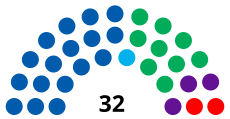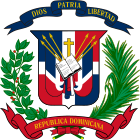

Congress of the Dominican Republic
Congreso de la República Dominicana
| |
|---|---|
 | |
| Type | |
| Type | |
| Houses | Senate Chamber of Deputies |
| Leadership | |
President of the Senate |
Ricardo de los Santos Polanco, PRM |
President of the Chamber of Deputies |
Alfredo Pacheco, PRM |
| Structure | |
| Seats | 222 32 senators 190 deputies |
 | |
Senate political groups | PRM and allies (18)
Opposition (14) |
| [[File:|230px]] | |
Chamber of Deputies political groups | PRM and allies (101)
Opposition: (89) |
| Elections | |
Last Senate election | 5 July 2020 |
Last Chamber of Deputies election | 5 July 2020 |
Next Senate election | 19 May 2024 |
Next Chamber of Deputies election | 19 May 2024 |
| Meeting place | |
 | |
| Palace of Congress, Santo Domingo, Dominican Republic | |
| Website | |
| http://www.congreso.gov.do | |
 |
|---|
|
|
|
Legislature |
|
Executive
|
|
|
|
Recent elections
|
|
|
|
|
|
|
|
The Congress of the Dominican Republic (Spanish: Congreso de la República Dominicana) is the bicameral legislature of the government of the Dominican Republic, consisting of two houses, the Senate and the Chamber of Deputies. Both senators and deputies are chosen through direct election. There are no term limits for either chamber.
As provided by the Dominican Constitution, each of the 178 members of the Chamber of Deputies represents a district and serves a four-year term. Chamber seats are apportioned among the states by population. The 32 Senators serve staggered four-year terms. Each province has one senator, regardless of population.
The Constitution vests all legislative power in the Congress. The Chamber and Senate are equal partners in the legislative process (legislation cannot be enacted without the consent of both chambers); however, the Constitution grants each chamber some unique powers. The Senate is empowered to approve treaties and presidential appointments. Revenue-raising bills must originate in the Chamber of Deputies, which also has the sole power of impeachment, while the Senate has the sole power to try impeachment cases.
The Congress meets in the Palace of Congress in Santo Domingo.
The term Congress actually refers to a particular meeting of the national legislature, reckoned according to the terms of representatives. Congressional elections are held in even numbered years divisible by four. Suffrage is universal and compulsory for all Dominican citizens aged over 18 or under that age if married.
The Congress of the Dominican Republic was founded after the drafting of the Constitution, on 6 November 1844. In the chapter 2 of this Constitution is mentioned how the Legislature would be divided into two legislative bodies called Tribunat (corresponding to the current House of Deputies) and Conservative Council (corresponding to the current Senate). Earlier, deputies and senators were elected by indirect and based on census vote and candidates could only be those with properties.
In 1854, the Constitution was amended to change the name of the Conservative Senate Council. Later, in December of the same year, a new revision to the Constitution was made to merge the two chambers in a Consultant Senate, being the first period in the history of the Dominican Republic in which the Legislature was governed by a unicameral Congress. The bicameral system was again replaced in November 1865 after the Restoration of the Republic, separating the Congress in a House of Representatives and House of Representatives.
Between 1866 and 1907, the Dominican Republic is disputed between bicameral and unicameral, eliminating the Senate in the constitutional amendment of 1866, restoring it in 1878, and returning it to eliminate in 1880. The Senate reappeared as house of Congress in the Constitution of 1908, from which the bicameral system remained constant. During the first US intervention, Congress was dissolved not before elected president Francisco Henriquez y Carvajal. After the restoration of national sovereignty, Congress was again restored, and in 1927 the election of legislators were allowed by direct vote.
With the rise of Rafael Leonidas Trujillo to power, the Congress became a cover for his political ambitions. In 1935, Trujillo was appointed by the Congress president for life, instituted on January 11 of each year as the Day of the Benefactor, and renamed the capital city Ciudad Trujillo. In 1941, Congress recognized the civil rights of women, allowing women to vote in the country.
After Trujillo's death, and after deposition of the constitutional government of Juan Bosch in 1963, Congress was dissolved by the Triumvirate. On 25 April 1965 a military group seeking to restore the Constitution of 1963 and replace the president Bosch entered the National Palace and made capitulate to Triumvirate, after which the newly restored Congress was sworn in as provisional president to the President of the Chamber of Deputies Jose Rafael Molina Ureña. However, President Urena had to resign two days later and applied for asylum. At this, the Congress appointed provisional president Francisco Alberto Caamaño Deñó, who took office on May 4 in front of a crowd at Independence Park.
After the second US intervention, and after the new constitutional government elected in 1966, under the presidency of Joaquín Balaguer, Congress made the longest constitutional reform of all constitutional reforms. This Constitution was amended in 1994 to prohibit presidential re-election and separate congressional and presidential elections (which had been held together since the reform of 1927) with 2 years apart.
Congress passed a constitutional amendment in May 2002, to restore the limitation of only 2 consecutive reelections. During the election of President of the Chamber of Deputies on 16 August 2003, there was a shooting inside the room of the legislative chamber.
Later in the constitutional reform of 2010, Congress passed a non-consecutive presidential reelection law, and rejoined the congressional and presidential elections, which are exceptionally extended the term of elected legislators in 2010 from 4 to 6 years until 2016.
Congress exercises its review function by means of the Speech of Accountability and inquests. The Speech of Accountability it is the responsibility of the President of the Republic to report annually, before Congress, on the budgetary, financial and management administration that occurred in the previous year, as established in article 128, paragraph 2, subparagraph f) of the Constitution, An explanatory message of the macroeconomic and fiscal projections, expected economic, financial and social results and the main priorities that the government intends to implement under the General State Budget Law approved for the current year. The Constitution also contemplate that Congress should receive reports from the Chamber of Account, the Ministries and the Ombudsman.
The legislative chambers, as well as the permanent and special commissions which they constitute, may invite ministers, vice ministers, directors and other civil servants of the Public Administration, as well as any natural or legal person, to provide pertinent information on matters of Which are empowered.[citation needed]
The reluctance of the persons cited to appear or to render the required declarations, can be sanctioned by the criminal courts of the Republic with the penalty indicated by the current legal provisions for cases of contempt of public authorities, at the request of the corresponding chamber.[citation needed]
To question ministers and vice ministers, the Governor of the Central Bank and the directors or administrators of autonomous and decentralized agencies of the State, as well as those of entities that administer public funds on matters within their competence, when agreed by the majority of members Present, at the request of at least three legislators, as well as to obtain information from other public officials competent in the matter and dependent on the previous ones. If the said official or official does not appear without justifiable cause or their statements are considered unsatisfactory, the chambers, with the vote of two thirds of their members present, may cast a vote of censure against them and recommend their dismissal from the office. President of the Republic or the corresponding hierarchical superior for breach of responsibility.[citation needed]
When the Chamber and the Senate celebrate they meetings together is denominated National Assembly, the Assembly it's usually call for the Speech of Accountability and to celebrate the commemorative or protocolary acts.
To a joint session to be declare as National Assembly the plenary most have more than half of the members of each chamber present. Its decisions shall be taken by an absolute majority of votes, except when it is convened to amend the Constitution. The National Assembly or the Joint session of both chambers are governed by its rules of organization and operation. In both cases the presidency will be assume by the President of the Senate; The vice president, the President of the Chamber of Deputies and the secretariat, the secretaries of each chamber.
Its responsibility of the National Assembly:
The latest election for the Congress was in 2020, as part of the general election.
The following table shows the composition of the Chamber of Deputies at the start of the most recent legislative period (2020–2024) ignoring changes that may have occurred since then due to party transfers.
The following table shows the composition of the Chamber of Deputies at the start of the most recent legislative period (2020–2024) ignoring changes that may have occurred since then due to party transfers.
|
National bicameral legislatures
| |
|---|---|
| Federal |
|
| Unitary |
|
| Dependent and other territories |
|
| Non-UN states |
|
| Historical |
|
| Related |
|
| |
|
National legislative bodies of the Americas
| ||
|---|---|---|
| Sovereign states |
| |
| Dependencies and other territories |
| |